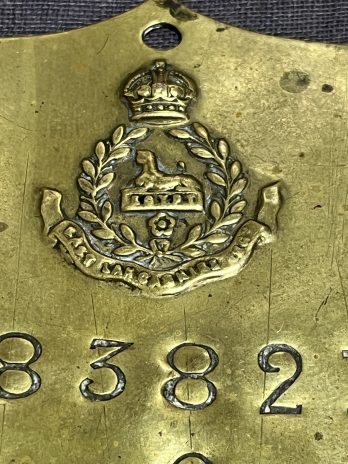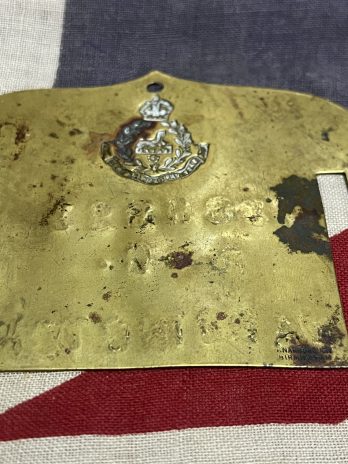East Lancashire Regiment/Royal Artillery bedplate. Waddington. Clitheroe, Lancashire.
£35.00
Availability: 1 in stock
Stamped 3383821 R.C. Waddington
Edward Waddington served with the 156/52nd Light Anti Aircraft Regiment Royal Artillery (TA)
The 52nd (East Lancashire) Light Anti-Aircraft Regiment, (52nd (EL) LAA Rgt) was a Royal Artillery (RA) air defence unit of Britain’s part-time Territorial Army (TA) converted from a field artillery unit just before the outbreak of World War II. It served in the Battle of France, shooting down a large number of aircraft before being evacuated from Dunkirk. It was then sent to the Mediterranean, where detached batteries were destroyed in the fighting in Greece and Crete. The reformed regiment then took part in the defence of the Suez Canal and later in the Italian Campaign. It continued in the postwar TA until 1955 when it merged with other units in Lancashire.
During the 1930s the increasing need for anti-aircraft (AA) defence was addressed by converting a number of existing TA units to the AA role. One unit chosen for conversion was the 93rd (East Lancashire) Field Brigade, Royal Artillery, based at Burnley and commanded by Lieutenant-Colonel C.H. Mather. After conversion into a Light Anti-Aircraft (LAA) regiment on 28 November 1938 it had the following organisation:[1][2][3][4]
52nd (East Lancashire) LAA Regiment
Regimental HQ (RHQ) at Burnley Barracks
154 (East Lancashire) LAA Battery at Artillery Drill Hall, Church – converted from 201 Field Bty
155 (East Lancashire) LAA Battery at Burnley Barracks – converted from 202 Field Bty
156 LAA Battery at Clitheroe – newly-formed
At this stage LAA units were armed with Light machine guns (AALMGs), usually old Lewis guns, but the new Bofors 40 mm gun was on order. After the Munich Crisis in 1938, the TA was doubled in size, and in June 1939 the 52nd formed a duplicate unit at Oswaldtwistle, the 56th Light Anti-Aircraft Regiment, which received its ‘East Lancashire’ subtitle in February 1942.
Enlisting in February 1939, Edwards full entitlement would be:
1939-45 Star, Africa Star, Italy Star, Defence and War medals plus entitlement to a Territorial Efficiency medal 1946.
An address found for Edward is 21 Bollard Prospect, Clitheroe, Lancashire.







